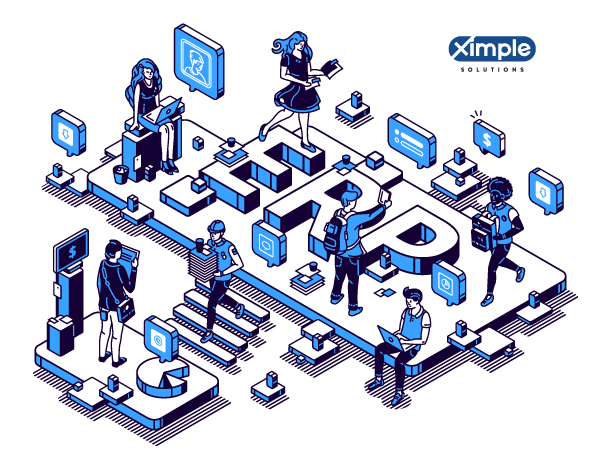
Ximple offers IMS ERP for Inventory Management Software to Wholesale Distributors: On-Cloud Inventory Management Software and On-Premise Inventory Management Software.
Inventory (or stock) management is the most challenging part of the wholesale distribution business. If managed well, it has the potential to increase profitability. Else it can reduce margins and profitability. It will also tie up limited working capital, thus affecting all areas of the wholesale distribution operations.
Inventory management has an impact on both profitability and working capital management. Efficient inventory management leads to improvement in inventory turnover and reduction in the cost of goods sold, both of which improve profitability, and to improvement in cash flow which reduces working capital requirement.
A large number of items and a large number of transactions characterize inventory management. While this by itself is challenging, the effort required for optimal storage and tracking of on-hand Inventory adds to the complexity. An effective inventory management system will enable the handling of these challenges.
The best inventory management software is a standalone software that helps organizations effectively manage their Inventory. A standalone inventory management software may help small wholesale Distributors and Retailers to address their inventory quantities effectively since their needs may be limited.


As the Wholesale Distributors grow, a standalone inventory management system will prove to be inadequate. The three critical reasons for the inadequacy of standalone inventory management software are:
The best inventory management software must integrate with other business areas, including POS, Order entry system, Counters sales, Procurement Software, Warehouse Management System (WMS), Transportation and Shipping management, and Accounting software. The wholesale distributors can meet these requirements by leveraging IMS ERP for Inventory Management.
ERP for Inventory Management Software is an ERP (Enterprise Resource Management) Software that integrates the Inventory Management activities with the enterprise’s broader operations. This integration ensures a single source of truth of Inventory status across the Organization. An ERP for Inventory Management integrates the following business areas with Inventory.
Purchase Requisition: The user can review the inventory availability across the Organization before raising a Purchase Requisition.
Purchase Order: A buyer can check the expected receipts before placing a purchase order for an item. Demand planning can ‘see’ the on-hand availability and scheduled receipts before placing a requirement for an inventory item.
 SaaS Inventory System
SaaS Inventory System
The Warehouse Management system (WMS ) will ensure that the materials’ received’ by the Inventory Management system are stored in the correct location and the inventory availability reports are updated with this information. Besides, Warehouse Management ensures quick picking against consumption demand.
Integration with inventory management software ensures that quantity is kept up-to-date after each shipment of material Integration with Cost Management ensures that inventory value is updated accurately after every transaction based on the valuation method used by the organization. It provides updated costs in real-time and implements process changes promptly to eliminate costing mistakes.
An ERP for inventory management ensures that every inventory transaction is accounted for correctly and profitability information is available on a real-time basis.

As with any other business process, advanced technologies like Artificial Intelligence, Machine Learning, and Deep Learning will impact inventory management software as well.
Wholesale Distributors are already experimenting with smart storage with AI algorithms identifying the best storage location to store the new lot and smart picking. The algorithm identifies the optimum pick route. AI will be further used for predictive analysis of obsolescence. Besides, technologies like QR Codes will become prevalent.
A smart supply chain software will further reduce storage costs. Customer orders will be registered online, and products manufactured or assembled at distribution centers. based on individual orders (customization), the production & distribution will be scheduled based on the dispatch truck availability through GPS and logistics application and the finished product will be loaded directly into the truck, thus bypassing storage altogether!
Another new paradigm in wholesale distributions and retail business is that of Omnichannel customer experience. The E-Commerce system has ensured a broad and large customer base, which means that the transaction challenges in inventory management will explode. Many geographically spread out customers mean many smaller distribution centers, including planning, availability, and storage challenges. Besides, enough Inventory has to be maintained in stores as well, which calls for additional carrying costs.
The characteristic of inventory management software is fixed core transactions. Every wholesale distributor and retail business procures, stores, tracks, and ships Inventory. The core processes are not going to change even in the future. However, the associated business processes that impact are improving at a rapid pace. These changes will add pressure on inventory management by shortening lead times and charging high costs for inventory shortages.
The opportunities for innovation in inventory management are only limited by the ability of the ERP to adapt quickly to the new technologies. Ability-to-market and speed of innovation will be a key differentiating factors for ERP vendors in the times to come.

Ximple Offers SaaS-based Cloud ERP software to Leading Wholesale Distributors. Our inventory management software offers real-time inventory visibility, improved inventory management, eliminates stock-out, improves inventory turnovers, reduces obsolescence inventory, assures timely new product introductions, reduced manpower to manage inventory, inventory management software integrated with warehouse management system (WMS), POS & counter sales, Demand planning & forecasting, Accounting system for small and mid-size wholesale distributors, includes the ability to scale up to multi-billion $ wholesale distribution business. It severs Inventory Management needs for Electrical Wholesale Distributors, Automotive Distributors, HVAC wholesalers, Plumbing distributors, Fasteners Distributors, Industrial Distributors, Hose and Fittings Distributors, Construction Distributors, Electronics Distributors, Pharmaceuticals, Chemical Distributors, Power Transmissions & Bearing Distributors & Convenience Store Distributors.
 Faqs
Faqs
Inventory management ERP is one type of system that helps businesses to handle all departments of their business on one platform, including finance, inventory, planning, logistics & operations.
ERP software helps the company to make better decisions by providing accurate inventory data. Inventory management ERP helps to control business departments including logistics, finance, operations, and inventory that improve the efficiency of the business.
There are many software available in the market that supports inventory management functionality but Ximple ERP is one of the best among them as its specially designed for wholesale distribution business and easily integrates with any inventory business. Ximple ERP understands inventory management problems and offers solutions including add items, fulfill orders and view inventory from any device at any location.